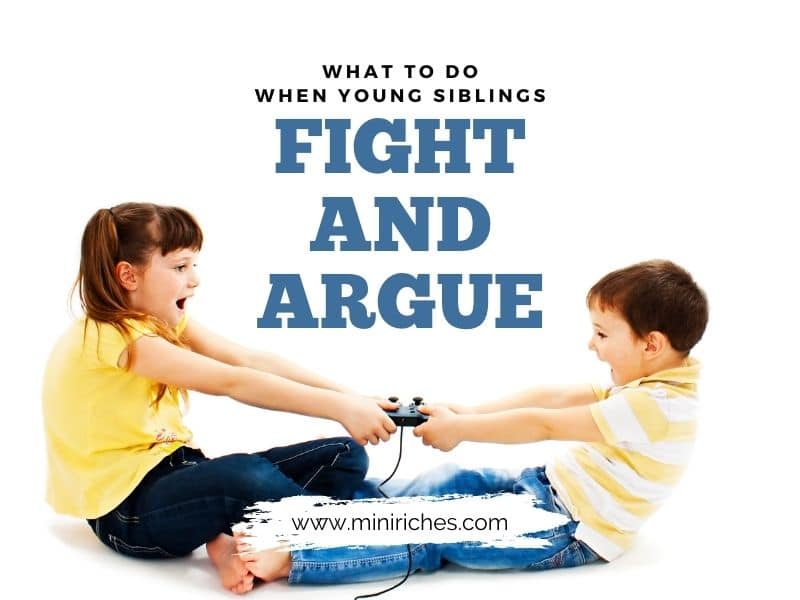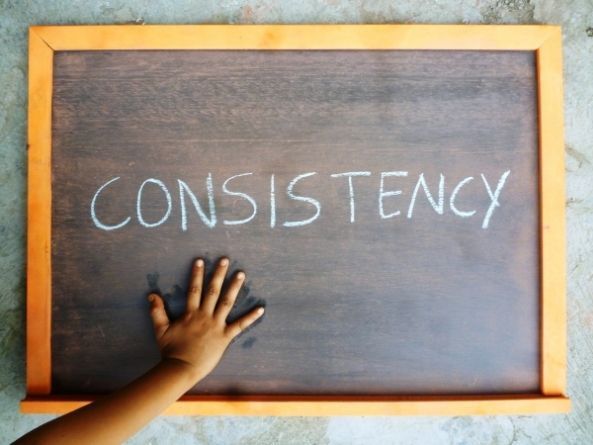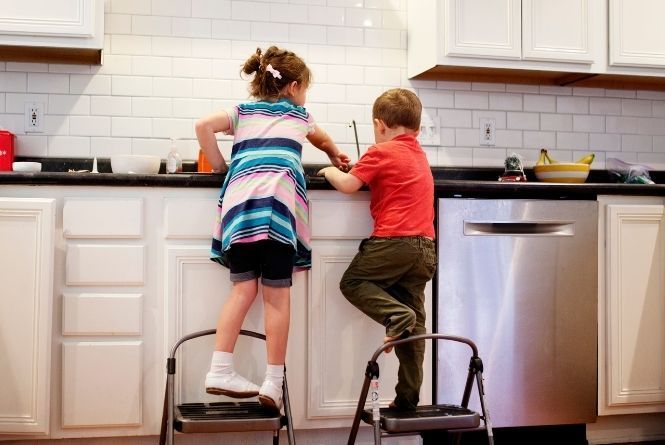
What to Do When Young Siblings Fight and Argue
Our children bicker, argue, tease, pick at one another, and sometimes physically fight. In their defense, the physical fighting usually starts in good fun. Someone eventually gets hurt, and it’s taken personally. Then they begin attacking each other without restraint.
It’s a fact of life that if you have multiple children, they will find themselves engaged in one or more of those behaviors. So, what do you do when young siblings fight and argue?
Let’s get started with a few tips on what NOT to do when young siblings fight and argue.
Begin yelling at everyone.

When young siblings fight and you bark louder than them, they tend to switch their attention to you and not the fight they are tangled up in. The downside is that now the kids are even more upset because they think they are all in trouble and not just siblings fighting with each other. Also, yelling at everyone sets the tone that the loudest one wins, which is a terrible dispute settling strategy to teach your kids.
Do yourself a favor and simmer down from the excitement. When young siblings fight, separate the arguing children. When things have cooled off, get the gang back together, explain why it’s not ok to act that way, and move on.
Choose sides.
When young siblings fight, we typically blame the oldest more often than we probably should because he “should know better.” The reality is that he is also just a kid trying to navigate his feelings and reactions, and it is unfair to jump on him first when a sibling argument arises.
Draw negative comparisons.
There is already turmoil brewing when young siblings fight, don’t stir the pot by being just as bad as your kids. Words like, “You are always causing trouble!” and “Why can’t you ever just stop it!” can be more hurtful than helpful to your children. Telling them they always cause trouble sets them up to believe that trouble is all that is expected of them. We don’t want them to think that.

Asking a ridiculous question like, “Why can’t you ever just stop it?” is about as effective as having them explain String Theory. The answer is, they don’t know! As kids, they are navigating boundaries and struggling to remember them. Remind them of the boundaries. Enforce the boundaries. Don’t belittle your child for not remembering them 100% of the time. Chances are, you don’t see the 80% of the time when they do use the lessons you taught them.
Now, on what to do when young siblings fight and argue.
Try not to explode.

When young siblings fight, their bickering likely did not come at the most opportune time. Practice the restraint you want your children to imitate in their own lives. If you are just as fired up as your kids, have everyone separate into different rooms, or even just sit across the room from one another until you’re ready to solve the conflict.
Stop the fight before it gets physical.
If possible, stop the fight before it gets physical. I can usually hear my kids as they engage with each other. From what they say, how they are saying it, and even their physical proximity helps me judge whether I need to step in or give them space to work it out.
If they are already duking it out, quickly jump in. Pull them off of one another and have them sit in a time-out. When the heavy breathing and death stares subside enough to hold a coherent conversation, gather together for the conflict-solving conversation.
Review problem-solving skills.
Teaching conflict solving skills is golden. Like everything else you will teach them through their childhood, it will have to be taught 5,000 times for it to possibly sink in. Don’t get too disappointed when they have another argument they can’t resolve. When young siblings fight, just go over the conflict-solving skills you’ve already taught them 2,500 times.

Have each child state where they think the problem started. It is usually an accusation of he did this or she did that. Let it play out. You will eventually get to the starting point.
From there, have each child say what they think should happen next. Add in your own parental solutions. Together, you can all discuss which solution best fits the situation.
Ultimately, since you had to get involved, you get to decide the end solution. Which plays into my next tip.
Treat each child fairly.
Each child is an individual with their own unique ways of responding to consequences, situations, and criticism. In our case, the ones that bicker the most differ in age by five years, so the consequence needs to be age-appropriate as well.
Sometimes one child is more at fault than the other. Other times, it’s a 50-50 split. On rare occasions, one child is entirely at fault, and the other is innocent. As the parent, you get the fabulous job of determining which is which and then selecting the appropriate consequence or punishment.
Natural consequence verse punishment.
A natural consequence is what naturally follows a person’s actions—whether that be inaction or poor decision making. Punishment is more of a penalty for wrongdoing.
The benefit of a natural consequence is that it is more effective than a punishment in guiding a child to remember what follows their bad choices. This will help them to modify their behavior in the future and make better decisions.

I find punishments useful when I cannot come up with a natural consequence that fits the infraction. When young siblings fight and one child punches the other, a natural consequence is that they would get hit back. Obviously, we can’t let that happen. In this instance, I would likely dole out a punishment in the form of making the punching child do the chores of the child that he punched. This is, of course, assuming the child that got punched was innocent in the situation and did little to provoke being punched.
When young siblings fight, we try to let our kids settle their arguments. When it turns into name-calling and belittling each other, we step in. Clearly, they forgot that we don’t do that in our home, or any house for that matter. Not only is it disrespectful, but it sets them up to have poor skills when it comes to solving conflict.
7 clever natural consequences to do when young siblings fight and argue.
- When young siblings fight, have two minutes of complements for each kid. Let kid #1 have two minutes to say nice things about kid #2. Likewise, give kid #2 two minutes to say a bunch of nice things about kid #1. Our experience with this is it usually leads to smiles and forgiveness.
- Write a page on the benefits of having that sibling in their life. We suggest this option if one sibling is the main instigator. We give our child a full sheet of paper and have him write at least five reasons why he is so glad to have the sibling that he was arguing with in his life. This helps bring all the good qualities of their sibling to the forefront of their mind and hopefully reminds them of their humanity and their appreciation for that sibling in their life.

- Try specific apologies when young siblings fight. When each child seems equally at fault for the fight, we have them write and read a very specific apology. One of our kids has gotten into the habit of just yelling, “Geez, I’m sorry!” By the tone in his voice and lack of care in his actions, I’d wager he isn’t actually sorry. Having each child write out what they are specifically sorry for, and read it out loud to the other, helps them find what the actual problem was and how they contributed to it. This will help them gain a sense of genuine remorse and see the inner workings of where the problem started.
- When young siblings fight, sometimes it’s just right for them to kneel and hug it out. When kids aren’t getting along, sometimes they just need to kneel and hug each other. You can have them stand if you don’t favor the idea of kneeling. We prefer kneeling as it promotes a sense of suffering together—they chose to fight together, and now they have to suffer together.
- Doing chores together is a good option when young siblings fight that are close in age. This is another form of suffering together because of their poor choices. Instead of sending them each to do a different chore, have them work on a chore together. Working towards a common goal promotes bonding and gives them a sense of accomplishment to achieve their goal together.

- Writing lines can also be beneficial when young siblings fight. Do not have your child write, “I will not tease my brother.” Instead, have your child write a positive statement like, “My brother is a fun kid. I’m so happy he’s my brother.” Reinforcing the good and not focusing on the bad will help the love they have for each other stick in their brains.
- Have each child involved in the fight complete a random act of kindness toward the other. When young siblings fight, they are seeing red and aren’t seeing the love they have for each other. Doing something random that puts a smile on the face of the brother or sister they weren’t getting along with will help bring them back to their roots and affirm the family love they have for each other.
What do you do when young siblings fight and argue in public?
It can be volcanically infuriating when your children choose the public arena to hash out their differences. Whether it happens at a grandparent’s house or in the middle of the store, I ask you to muster every drop of restraint that you can. Exploding in public will only make you feel absolutely terrible later on.
When young siblings fight and argue in public, try not to indulge in why they are behaving that way. Your goal is to make it stop quickly and without any loud incidents. If you find yourself at a residence, take the children aside and speak to them. Speak in a quiet voice, so the rest of the house doesn’t hear you, and the children have to pay close attention to hear you. Assert that the bad behavior stops now, and they are to stay apart until they can get along. Any further problems will result in double the consequences at home.

The same goes for when you are at a grocery store or some other errand. Huddle your bickering children around you and assert that the behavior stops now. You do not need to let them explain—you need to keep moving so you can get through the errand and back home as quickly as possible. If you can, stay between the kids to minimize interactions.
Sometimes it’s ok to let the kids explain what was going on. You’ll need to be the judge if it is the right time and place for it.
The fine print…
No one said parenting was easy. We have a natural urge to yell, punish, and act just as bad as our kids when they are infuriating with their ability to fight and argue at the drop of a hat. The difference between the kids and you is that you are the adult. You’ve learned that those childish behaviors solve nothing and to further promote them with your own poor behavior only makes the situation worse.
We have faith in you! Practice patience. Do not jump the gun on punishments, but instead take a minute to breathe and think about the situation and how you need to handle it. You got this!
How do you handle things when young siblings fight? Let us know in the comments below if you have any more great tips for what to do when siblings fight and argue!

I am not very proud to say this, but when my younger brother and I were growing up, I was the main instigator, lol! As a result, we don’t have a great relationship now as grownups. I wish my parents knew about these tips and did something to change that. Thanks for sharing. I’ll keep these tips in mind in case I need them when the time comes.
Thanks for the kind words! We’ve noticed that our two with a five-year age difference fight with each other the most. The older one thinks the younger one is annoying because the younger one is getting older but still acts like a “little kid” from time to time. The older one doesn’t always remember that he was once five years younger and acted the exact way, so we try to remind him of that.
Sibling squabbles are no good, but It is such a good point that treating each child fairly doesn’t mean treating them the same!
Our children don’t always think it’s fair, but they’ll understand later in life!